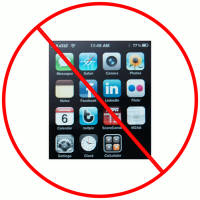A Media Fast: Radical, Relevant and Really Rejuvenating

In our current era of on-demand media we seldom question the effect of its constant presence in our lives. Tablet computers, e-readers, television, radio, smartphones, the Web, and for those of us with Luddite fixations, magazines and newspapers, are all part of most people’s everyday experiences. They enable us to stay informed while sometimes taking us on amazing journeys. But the content and experiences that these outlets offer also consume space in our minds that can have a profound effect on our emotional state, and can impact our relationships, job performance, and creativity. Additionally, our ability to truly know ourselves from an authentic place must first traverse this barrier of information, noise and chatter.
A media fast involves disconnecting from all personal computing devices, electronic toys and games, not watching television, reading any newspapers or magazines, checking or sending any e-mails, or even talking on the phone. Much like a food fast can help clear out and clean out a sluggish body, leaving it feeling refreshed and lighter, so, too, can a media fast clear out our heads and hearts. As a seasonal Spring ritual, this is an excellent way to hit the personal re-set button on your psyche and perhaps come to some very enlightening, if not profound insights.
How A Media Fast Can Benefit Your Health

Research has shown that print news, the internet, and television programming can have an intense effect on mood, causing sadness and anxiety. The worse state of affairs is that so many of us, without realizing it, have moved past the sadness and anxiety and are existing in a state of numb denial to these effects. Concurrently, everything coming at as has been designed to capture our fractured attention, so the intensity levels from visuals, to sound, to actual content has been amped up. Nothing is presented at normal communication levels anymore because that would be “boring” and would get lost in the maelstrom. Over indulgent media consumption exposes us to “false drama” where the stakes are higher, the outcomes more severe. Our facility to distinguish subtleties and to interpret non-verbal cues in real life with whom we are trying to communicate, is altered. The ability to have thoughtful and measured conversations and discourses is affected, if not by our behavioral expectations, then by the interruptions of our beeping and ringing “personal communication devices.”
A break from all this can help you develop a more conscious relationship with what you see and hear, both real and fictional. When you aren’t continuously subjected to the media, as well as to what other people think of that media, then you are able to look at what you are seeing or reading more objectively and form your own opinions. You decide what is good and what is bad, what is true, what is false, what is so much marketing, fear mongering and political maneuvering.

On the simplest level, undertaking this fast will free up thinking space. Removing the stimulation of electronic devices that require instantaneous reflexive brain functioning, will re-connect you to a different kind of cognitive awareness. Rumination and reflection come through your brain and into your body having the effect of lowering blood pressure and heart rate. This physiological reaction may even introduce you to creative aspects of yourself that you didn’t know existed, as you enjoy some quiet time and reconnect with other interests. The average person might panic at the first sounds of silence, and feel like they’ve been marooned on the moon, but it is this emptiness that opens up the space for a more expansive and clutter-free life. Ideas will present themselves to you more readily, and you will find yourself available to revel in the small joys of your own life. You also will be freer to live in the present moment, which is the foundation of a more authentic existence.

Recent Comments